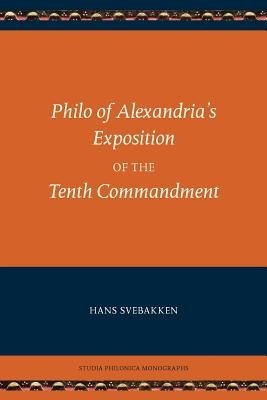
- We will send in 10–14 business days.
- Author: Charles Duke Philo
- Publisher: Society of Biblical Literature
- ISBN-10: 1589836189
- ISBN-13: 9781589836181
- Format: 15.2 x 22.9 x 1.5 cm, minkšti viršeliai
- Language: English
- SAVE -10% with code: EXTRA
Philo of Alexandria's Exposition of the Tenth Commandment (e-book) (used book) | bookbook.eu
Reviews
Description
As part of a larger exposition on the Ten Commandments, Philo offers in Spec.4.78b-131 a detailed exposition of both the Tenth Commandment, which he reads simply as You shall not desire, and the Mosaic dietary laws, which he identifies as a distinct set of subsidiary laws designed to promote observance of the Tenth Commandment. Setting his exposition in the context of Middle-Platonic moral psychology, this dissertation answers two fundamental questions: First, what, in Philo's view, does the Tenth Commandment prohibit? (All desire? A certain type? What type?) Second, how, in Philo's view, is the Tenth Commandment observed? (What are the mechanics of its observance? What role do the dietary laws play in its observance?)
EXTRA 10 % discount with code: EXTRA
The promotion ends in 21d.23:38:57
The discount code is valid when purchasing from 10 €. Discounts do not stack.
- Author: Charles Duke Philo
- Publisher: Society of Biblical Literature
- ISBN-10: 1589836189
- ISBN-13: 9781589836181
- Format: 15.2 x 22.9 x 1.5 cm, minkšti viršeliai
- Language: English English
As part of a larger exposition on the Ten Commandments, Philo offers in Spec.4.78b-131 a detailed exposition of both the Tenth Commandment, which he reads simply as You shall not desire, and the Mosaic dietary laws, which he identifies as a distinct set of subsidiary laws designed to promote observance of the Tenth Commandment. Setting his exposition in the context of Middle-Platonic moral psychology, this dissertation answers two fundamental questions: First, what, in Philo's view, does the Tenth Commandment prohibit? (All desire? A certain type? What type?) Second, how, in Philo's view, is the Tenth Commandment observed? (What are the mechanics of its observance? What role do the dietary laws play in its observance?)


Reviews